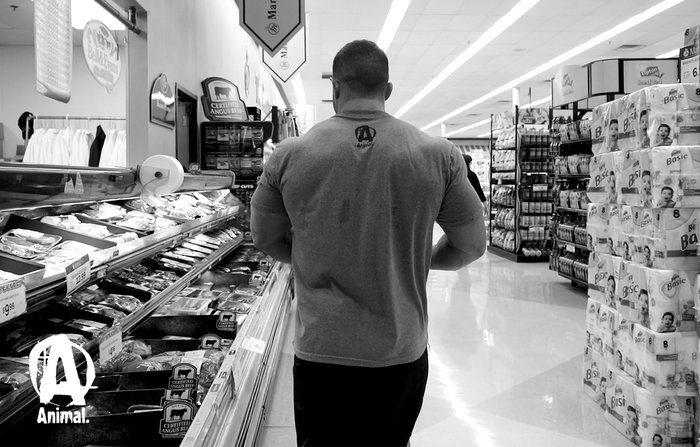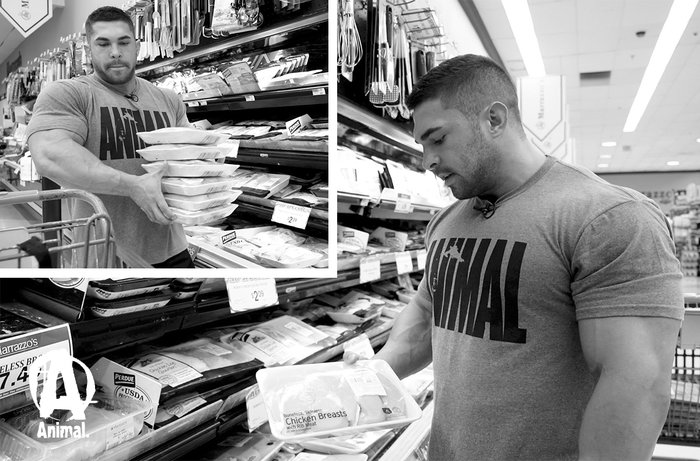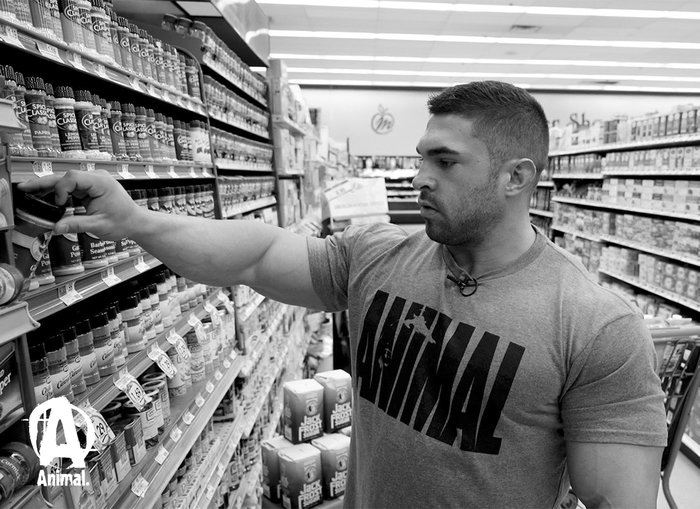As you'll see in the accompanying video, I had a $100 budget as part of the "Huge On A Hundred" series. The challenge was to buy a week's worth of bodybuilding-friendly food with only a Benjamin in my pocket. Although I was pre-contest dieting in the video and not eating as much as I usually do, my shopping strategy doesn't change no matter what I'm training for. Only the amounts differ.
These are a few helpful things to think about as you get your meal planning in order. Here's how it all went down.
Head To The Store With A Plan
Before I even set foot in the grocery store, I do a rough estimate of what my staples for the week should cost, and leave a little extra in my budget in case prices are higher than I expect. While price is an important factor, I prefer to shop in order of importance. Protein, the most important macronutrient for supporting muscle tissue growth, always comes first. Carbs, my energy source, is second, followed by added fats, which also provide energy and carry out many other functions in the body.

Nail Your Meal Timing And Quantity
I've learned from experience that it's important to eat every 2-3 hours throughout the day, but at night your job is to rest. If you're training hard and eating every 2-3 hours, you should be getting all the nutrition you need from your 6-7 daily meals and your supplements.
I understand the impulse to want to eat 24/7. When I first started bodybuilding, I had a hard time putting on weight until I watched Evan Centopani's $50 episode of "Big On A Budget." Before then, my basic plan to build muscle was to eat every 2-3 hours around the clock. Before going to bed, I'd set alarms for every 2-3 hours throughout the night, wake up in a fog, try to slam down mass-gainer shakes with extra milk, then sleep for another few hours until the next meal.
The whole time, I had the right goal, but was going about it all wrong. I gained too much body fat. In the end, I added about 50 pounds, 40 pounds of which were probably body fat. Not only did I eat too much of the wrong things but, by waking up in the middle of the night to eat, I wasn't getting enough rest, which interfered with my muscle growth.
Centopani taught me you can meet all your nutritional requirements during your normal waking hours—as long as you take time to plan your meals.

Cover Your Macronutrient Needs
Unless you're doing fasted cardio in the morning, you should eat a meal or drink a protein shake as soon as you wake up. You should also keep the amount of protein you consume consistent across every meal. I try to get 50-60 grams of protein at every meal, usually in the form of egg whites, chicken, or fish. The amount of carbohydrates and fats varies depending on look and feel. Although I prefer fresh vegetables, frozen vegetables are a good choice if you're short on time or money.
I include carbs in my pre- and post-workout meals because they give me the energy I need to perform well in the gym, then start my recovery. Low-carb dieting is best when preparing for a contest, but I keep my carbs relatively low in the offseason, too, if for no other reason than to stretch my food dollars.

I also keep the fat incredibly low while I'm dieting for a contest. If I consume any fat during contest prep beyond what's in my protein, it's usually as healthy fats such as egg yolks, almonds, avocado, or coconut oil. My typical breakfast consists of a couple of whole eggs with egg whites. Overall, I try to add fats only to those meals that don't contain additional carbs.
Just before a contest, I take in as few as 1,600-1,700 calories a day. I keep my protein intake between 300-350 grams, drop my fats to 30-35 grams, and usually completely remove carbs. I never deviate from my contest-prep food choices either. You should not follow this low-calorie diet year-round.
Get Your Micronutrients To Aid Digestion
Most people only think about macronutrients in their diet, even though micronutrients can be just as important in maintaining proper organ function. If you consume too few fats, carbs, and overall calories, you can impair the functioning of certain organs. Insufficient carbs and fats can also slow your digestion.
Since digestion is the key to absorbing all the nutrients into the body, make sure to consume enough vegetables throughout the day. They will provide your body with the vitamins, minerals, and fiber that it needs to maintain good digestion.

Variety Is The Spice Of Life
A good diet is important, but so is good-tasting food. When you enjoy your meals, dieting becomes easier. You don't have to cook like you're running a five-star restaurant, but it helps to learn about seasonings and sauces. Just make sure there are no additional calories hidden in the ingredients. Some products claim to have zero calories, when in fact they contain added fats or carbs—especially sugars.
I like to use seasoned salts, since most contain sodium and spices only. I've found that artificial sauces and food flavorings cause me to gain water weight, slow down fat loss, and create more food cravings. I've had the best results when I just keep my menu simple, but tasty, and I hope that'll work for you, too.


